2020
 Genes could be key to new Covid-19 treatments, study finds
Genes could be key to new Covid-19 treatments, study finds
14 December 2020
Potential treatments for Covid-19 have been identified after the discovery of five genes associated with the most severe form of the disease, in research involving Queen Mary academics.
 No deal Brexit could have detrimental impact for four million people in UK living with a rare disease
No deal Brexit could have detrimental impact for four million people in UK living with a rare disease
12 December 2020
Experts have warned that a ‘no deal’ Brexit will result in the exclusion of the UK from the 24 European Reference Networks (ERNs) that were established to improve the care of patients bearing the lifelong burden of a rare disease, which require highly specialised diagnosis and treatment.

11 December 2020
Steffen Petersen, Professor of Cardiovascular Medicine at Queen Mary University of London, has been elected as President of the European Association of Cardiovascular Imaging (EACVI).

10 December 2020
We are pleased to announce that Dr Sadani Cooray from the William Harvey Research Institute (WHRI) was recognised for her outstanding contribution to pharmacology education at an online ceremony held on Tuesday 8th December.

2 December 2020
A new collaborative study involving researchers at Queen Mary University of London investigates a new image analysis toolkit for MRI scans. In this Q&A Dr Zahra Raisi-Estabragh explains how Radiomics analysis can help us to better diagnose heart disease.
 The Effect of Blood Lipids on the Left Ventricle: A Mendelian Randomization Study
The Effect of Blood Lipids on the Left Ventricle: A Mendelian Randomization Study
18 November 2020
A new study by researchers at Queen Mary University of London demonstrates that bad cholesterol has a direct causal effect in inducing heart disease.
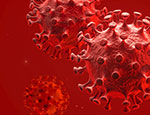 Causal Inference for Genetic Obesity, Cardiometabolic Profile and COVID-19 Susceptibility: A Mendelian Randomization Study
Causal Inference for Genetic Obesity, Cardiometabolic Profile and COVID-19 Susceptibility: A Mendelian Randomization Study
13 November 2020
A new study led by researchers at Queen Mary University of London uses a novel approach to investigate the effects of cardiovascular risk factors on the risk of COVID-19 infection.

10 November 2020
As the UK’s second lockdown gets underway, a group of 79 researchers, public health professionals, and healthcare workers are calling for a sustainable public health strategy for COVID-19.
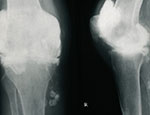
27 October 2020
A new study led by researchers at Queen Mary University of London provides potential novel biomarkers for predicting patient responsiveness to disease modifying anti-rheumatic drugs (DMARDs).
 Herd immunity in COVID-19 control is a ‘dangerous fallacy’, say authors of open letter
Herd immunity in COVID-19 control is a ‘dangerous fallacy’, say authors of open letter
15 October 2020
A group of 80 researchers say that a so-called ‘herd immunity’ approach to managing COVID-19 by allowing immunity to develop in low-risk populations is “a dangerous fallacy unsupported by the scientific evidence”.
 Queen Mary researcher recognised in the Queen’s Birthday honours
Queen Mary researcher recognised in the Queen’s Birthday honours
12 October 2020
Charles Knight, Professor of Cardiology at Queen Mary University of London and Chief Executive of St Bartholomew’s Hospital, has received an OBE for services to the NHS and people with heart disease in the Queen’s birthday honours.
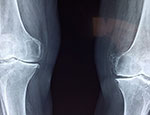 Poor bone quality is linked to poor cardiovascular health
Poor bone quality is linked to poor cardiovascular health
25 September 2020
New research by Queen Mary University of London and the University of Southampton’s Medical Research Council Lifecourse Epidemiology Unit (MRC LEU) has found associations between lower bone mineral density and worse cardiovascular health in both men and women.
 Researcher awarded prestigious cardiology prize for MRI discovery
Researcher awarded prestigious cardiology prize for MRI discovery
22 September 2020
Dr Nay Aung, an academic clinical lecturer at Queen Mary University of London, has been awarded the Royal Society of Medicine President’s prize for best cardiology PhD project.
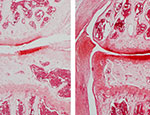 ROR2 blockade as a therapy for osteoarthritis
ROR2 blockade as a therapy for osteoarthritis
17 September 2020
In a new study, published in the journal Science Translational Medicine, researchers from Queen Mary University of London have developed a prototype drug that can heal cartilage and simultaneously help with pain. In this research Q&A Dr Anne-Sophie Thorup from the Centre for Experimental Medicine and Rheumatology explains why the findings are significant.
 Specialist centres hold key to keeping heart attack victims alive, major study shows
Specialist centres hold key to keeping heart attack victims alive, major study shows
4 September 2020
A trial led by Queen Mary University of London and Barts Health researchers looking at the effect of stem cell therapy in treating heart attack patients has revealed the importance of specialist centres to extending life.
 New molecule repairs cartilage and relieves symptoms of osteoarthritis
New molecule repairs cartilage and relieves symptoms of osteoarthritis
3 September 2020
A newly discovered molecule has been found to provide long-lasting regeneration of bone and cartilage defects, as well as symptom relief, and could potentially play a role in treating osteoarthritis, according to early research in animals led by Queen Mary University of London.
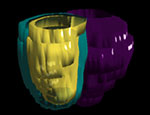 Architecture of the heart different between women and men and with age
Architecture of the heart different between women and men and with age
1 September 2020
Differences in the shape and texture of men and women’s hearts could potentially explain why their risk of heart disease differs, according to research led by Queen Mary University of London.
 Intracellular sodium elevation reprograms cardiac metabolism
Intracellular sodium elevation reprograms cardiac metabolism
28 August 2020
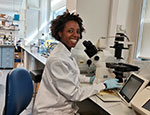 WHRI COVID Diaries: Q&A with Dr Vanessa Lowe
WHRI COVID Diaries: Q&A with Dr Vanessa Lowe
25 August 2020
In this Q&A WHRI researcher Vanessa Lowe shares her experience of helping with COVID-19 testing at the UK Biocentre in Milton Keynes.
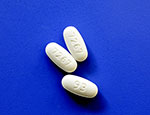 Cheap diabetes drug may reverse blood vessel damage and prevent multi-organ failure
Cheap diabetes drug may reverse blood vessel damage and prevent multi-organ failure
22 July 2020
A BHF funded study involving researchers from Queen Mary University of London has found that metformin-a cheap drug commonly used to treat type 2 diabetes- could be used to stop blood vessels from leaking and reverse the damage caused during sepsis and multi-organ failure.
 Queen Mary BHF Accelerator Award enables Covid-19 research
Queen Mary BHF Accelerator Award enables Covid-19 research
16 July 2020
The British Heart Foundation (BHF) has allowed and encouraged institutions that hold Accelerator Awards (AA) to allocate currently uncommitted funds from their award to supporting Covid-19 research, at the discretion of the award director.
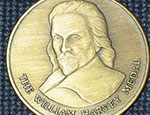 Success at the first-ever online WHRI Annual Review
Success at the first-ever online WHRI Annual Review
3 July 2020
The first virtual William Harvey Annual Review took place on Wednesday 24th June 2020 on Microsoft Teams.
 Higher rates of severe COVID-19 in BAME populations remain unexplained
Higher rates of severe COVID-19 in BAME populations remain unexplained
19 June 2020
Higher rates of severe COVID-19 infections in Black, Asian and Minority Ethnic (BAME) populations are not explained by socioeconomic or behavioral factors, cardiovascular disease risk, or by vitamin D status, according to new research led by Queen Mary University of London.

15 June 2020
Dr Sadani Cooray and Professor Nick Goulding from Queen Mary University of London have been jointly awarded the Rang Prize 2020 by the British Pharmacological Society.
 Antihistamines and similar drugs could slow down Huntington’s disease
Antihistamines and similar drugs could slow down Huntington’s disease
9 June 2020
Controlling dopamine signalling by targeting the histamine receptor has been shown to be a promising strategy for preventing the progression of Huntington’s disease in mice.
 Scientists discover more than 200 genetic factors causing heart arrhythmias
Scientists discover more than 200 genetic factors causing heart arrhythmias
21 May 2020
Hundreds of new links have been found between people’s DNA and the heart’s electrical activity, according to a study of almost 300,000 people led by researchers at Queen Mary University of London and the Broad Institute of MIT and Harvard.
Thirty-eight new gene regions that influence the Tpe interval, an electrocardiographic marker associated with susceptibility to malignant ventricular arrhythmias and sudden cardiac death, have been discovered in the largest genetic study to date.
 The uncertainties in modelling the COVID-19 pandemic
The uncertainties in modelling the COVID-19 pandemic
1 May 2020
Dr Deepti Gurdasani from Queen Mary’s William Harvey Research Institute and Hisham Ziauddeen from University of Cambridge are co-authors of a correspondence piece in The Lancet Global Health which suggests there were limitations in some assumptions used in the COVID-19 pandemic models forming part of the scientific evidence considered by the UK Government. In this blog post, they explain the importance of real-world evidence being used alongside modelling to develop public health responses.
A joint international study led by researchers at Queen Mary University of London explores how variants that might be overlooked in standard analyses can be pathogenic when combined with much rarer disruptive changes.
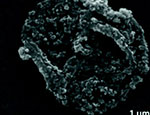
30 April 2020
New research from Queen Mary University of London suggests that a novel magnetism-based drug delivery approach could help ensure drugs are not removed from where they are needed in the body.
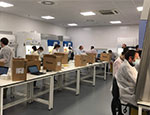 Inside the lab testing thousands of NHS samples for COVID-19
Inside the lab testing thousands of NHS samples for COVID-19
28 April 2020
Queen Mary University of London has been providing support to the UK Lighthouse Labs Network – the national COVID-19 diagnostic lab network. As well as donating a number of laboratory machines, a team of research staff have been seconded to help test thousands of samples from NHS workers every day.
Dr Neil Dufton, Lecturer in Inflammatory Sciences at Queen Mary’s William Harvey Research Institute, has been volunteering at one of the Lighthouse Labs in Milton Keynes and shares his experiences in this blog post.
 Antibodies could provide new treatment for OCD
Antibodies could provide new treatment for OCD
21 April 2020
Mental health conditions such as obsessive compulsive disorder could be treated in a new way using drugs that target the immune system, research suggests.
 Queen Mary and Barts Health launch Covid-19 research programme
Queen Mary and Barts Health launch Covid-19 research programme
20 April 2020
Queen Mary University of London and Barts Health NHS Trust, as part of their Barts Life Sciences initiative, have begun a new programme of Covid-19 research across Barts Health hospitals, including NHS Nightingale Hospital London.
 Queen Mary professor to lead new NHS Nightingale Hospital
Queen Mary professor to lead new NHS Nightingale Hospital
8 April 2020
Charles Knight, Professor of Cardiology at Queen Mary University of London and Consultant Cardiologist at Barts Health NHS Trust, has been announced as the Chief Executive of the new NHS Nightingale Hospital London.
 Diabetes drug reduces complications of long-term steroid therapy
Diabetes drug reduces complications of long-term steroid therapy
26 February 2020
A drug used to treat type 2 diabetes could offer a simple and cheap solution to reduce dangerous side effects of steroid treatment, new research from Queen Mary University of London suggests.
 World first in AI helps predict heart attacks and stroke
World first in AI helps predict heart attacks and stroke
14 February 2020
Artificial intelligence has been used for the first time to instantly and accurately measure blood flow, in a new study involving researchers from Queen Mary University of London.
-within-the-macula-150x115.jpg) International team delivers research breakthrough for leading cause of blindness
International team delivers research breakthrough for leading cause of blindness
7 February 2020
Researchers have identified a new protein linked to age-related macular degeneration (AMD) that could offer new hope for the diagnosis and treatment of the disease, which affects over 1.5 million people in the UK alone.
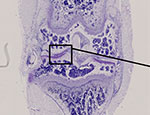 New research identifies a distinct way to control joint inflammation and arthritis
New research identifies a distinct way to control joint inflammation and arthritis
6 February 2020
In a new study, published in the journal Nature Communications, researchers from Queen Mary University of London observe that the promotion of synovial fibroblast senescence activates tissue protective mechanisms in the arthritic joint.
.jpg) Queen Mary Professor in Endocrinology elected to the Hungarian Academy of Medical Sciences
Queen Mary Professor in Endocrinology elected to the Hungarian Academy of Medical Sciences
5 February 2020
Professor Márta Korbonits from the William Harvey Research Institute at Queen Mary University of London was recently elected to the Hungarian Academy of Medical Sciences.
 Pinpointing rare disease mutations
Pinpointing rare disease mutations
31 January 2020
A new study from Queen Mary University of London and EMBL’s European Bioinformatics Institute has uncovered the genes essential for supporting life, which could help researchers to identify mutations responsible for rare childhood diseases.
 Volunteers needed: The impact of dietary inorganic nitrate on skin inflammation
Volunteers needed: The impact of dietary inorganic nitrate on skin inflammation
 100% student satisfaction for BSc Pharmacology and Innovative Therapeutics - National Student Survey 2020
100% student satisfaction for BSc Pharmacology and Innovative Therapeutics - National Student Survey 2020
 Discovery of New Genes Modulating the Tpe Interval: an Electrocardiographic risk marker for Sudden Cardiac Death
Discovery of New Genes Modulating the Tpe Interval: an Electrocardiographic risk marker for Sudden Cardiac Death
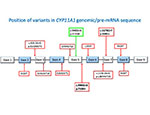 Predicted Benign and Synonymous Variants in CYP11A1 Cause Primary Adrenal Insufficiency Through Missplicing
Predicted Benign and Synonymous Variants in CYP11A1 Cause Primary Adrenal Insufficiency Through Missplicing
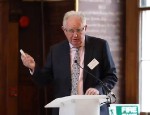 QMUL hosts Precision Medicine Leadership event showcasing developments from academia and industry
QMUL hosts Precision Medicine Leadership event showcasing developments from academia and industry